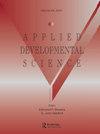课外活动参与、学校归属感与抑郁情绪:青少年代偿假说的检验
IF 1.5
3区 心理学
Q3 PSYCHOLOGY, DEVELOPMENTAL
引用次数: 0
摘要
学校社区的接纳感可以促进积极的心理结果。尽管课外活动发生在课堂之外,但参与课外活动的青少年通常会有更大的学校归属感。因此,我们对具有全国代表性的澳大利亚青少年样本(N = 3850, Mage = 12.41)进行了为期四年的纵向研究,考察了课外活动对学校归属感和抑郁情绪的影响。随机截距交叉滞后面板模型显示,时间1的课外活动参与预测了两年后的高等学校归属。反过来,更高的学校归属感通过预测个人抑郁情绪的减少,加强了积极的心理健康结果。此外,社区社会经济地位对课外活动的直接和间接影响有调节作用。居住在低社会经济地位社区的参与者从参与活动中获得了最大的好处,尽管他们的参与水平最低。我们的数据强调了有组织的休闲时间追求是如何促进幸福的,尤其是在更弱势的社区。本文章由计算机程序翻译,如有差异,请以英文原文为准。
Extracurricular activity participation, school belonging, and depressed mood: a test of the compensation hypothesis during adolescence
Feelings of acceptance within school communities can promote positive psychological outcomes. Despite occurring outside of the classroom, youth who engage in extracurricular activities typically report greater school belonging. Accordingly, we examined the longitudinal effect of extracurricular activities on school belonging and depressed mood in a nationally representative, Australian sample of adolescents (N = 3,850, Mage = 12.41) followed for four years. A random-intercept cross-lagged panel model revealed extracurricular activity participation at Time 1 predicted higher school belonging two years later. In turn, higher school belonging reinforced positive mental health outcomes, by predicting within-person decreases in depressed mood. Further, the direct and indirect effect of extracurricular activities were moderated by community-level socioeconomic status. Participants residing in low socioeconomic status communities garnered the greatest benefit from participating in activities, despite having the lowest levels of participation. Our data highlight how structured leisure time pursuits can promote wellbeing, especially within more disadvantaged communities.
求助全文
通过发布文献求助,成功后即可免费获取论文全文。
去求助
来源期刊

Applied Developmental Science
PSYCHOLOGY, DEVELOPMENTAL-
CiteScore
12.00
自引率
2.60%
发文量
23
期刊介绍:
The focus of this multidisciplinary journal is the synthesis of research and application to promote positive development across the life span and across the globe. The journal publishes research that generates descriptive and explanatory knowledge about dynamic and reciprocal person-environment interactions essential to informed public dialogue, social policy, and preventive and development optimizing interventions. This includes research relevant to the development of individuals and social systems across the life span -- including the wide range of familial, biological, societal, cultural, physical, ecological, political and historical settings of human development.
 求助内容:
求助内容: 应助结果提醒方式:
应助结果提醒方式:


